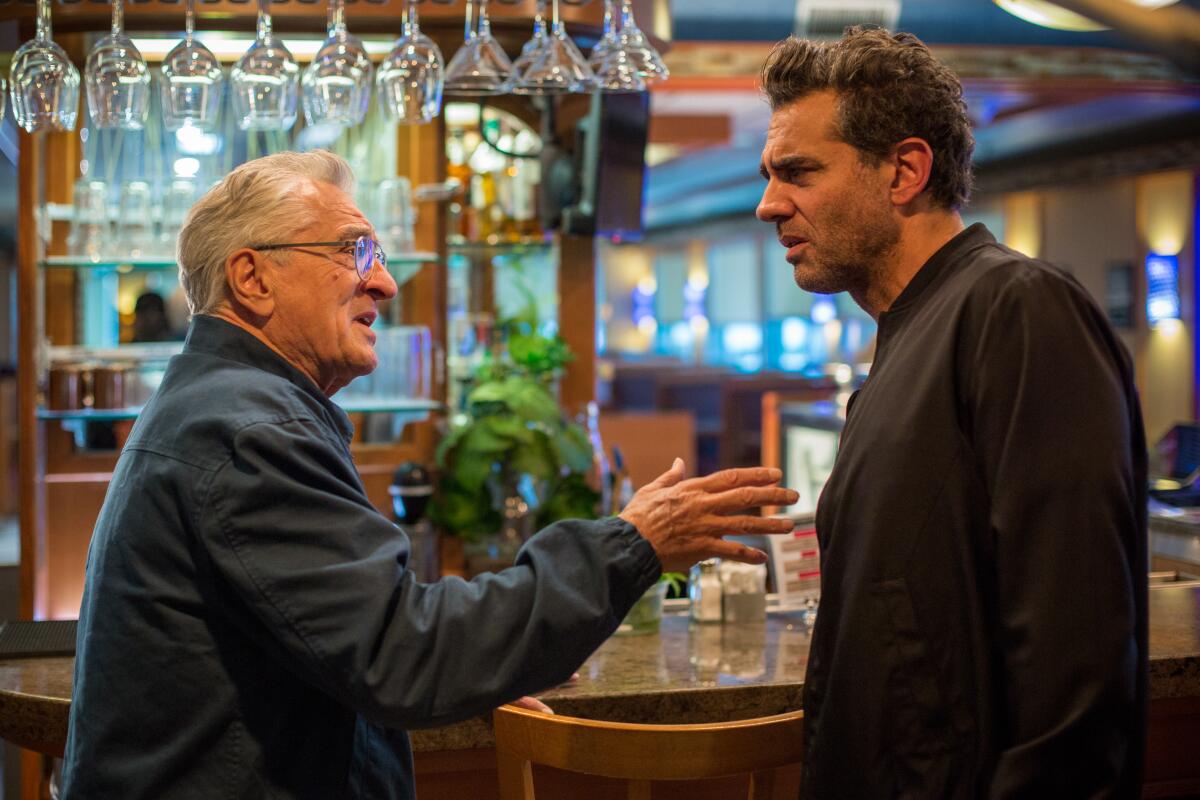Review: Father and son go cross-country in ‘Ezra,’ an autism-themed road movie made with sincerity

- Share via
Director Tony Goldwyn opens his family dramedy “Ezra” in the warm, collegial comfort of a comedy club. Max (Bobby Cannavale) perches on a stool, a handheld camera drifting closer as he tells jokes about his life — including ones about his autistic son — layering truths with punchlines, walking a tightrope of tones. It’s an invitation from Goldwyn and screenwriter Tony Spiridakis to sit down and listen a while as they unfurl this heartfelt, humorous and sometimes harrowing yarn.
It establishes right away that Max fiercely loves his son, Ezra (William A. Fitzgerald, an autistic actor making his film debut). Throughout the events that follow, we never lose sight of that, and that understanding offers a sense of emotional safety as the plot becomes increasingly high-stakes.
It’s this place-setting, as well as the strong lead performances, that allow Goldwyn to thread the needle on a story that could potentially go off the rails. “Ezra” is about a father desperate to protect his son, who takes him on a cross-country road trip where they experience catharsis and healing. It’s a fairly traditional road movie with an autism twist à la “Rain Man.” Also, the “road trip” is technically a kidnapping, since Max spirits Ezra out of bed in the home of his ex-wife, Jenna (Rose Byrne), and the film never shies away from that reality, in fact relying on this perceived danger to ramp up the dramatic tension and set the characters in motion.
The kidnapping stems from a misunderstanding that spirals into an unfortunate accident, coupled with Max’s own traumatic triggers. It’s never fully explicated in the screenplay, but Max’s mental health issues and possibly undiagnosed autism spectrum disorder are frequently alluded to, thrumming below the surface. His experience makes him an understanding father to Ezra but also somewhat hampers his ability to properly parent his son.
Upset that Ezra might be medicated with antipsychotics and placed in a special education school, Max assesses that the doctors, pharmaceutical companies and the state are in collusion to keep him and his son apart. He’s not necessarily wrong, but his desire to expose Ezra to the world and treat him like any other kid bumps up against Jenna’s wish to provide their son with every accommodation and suggested treatment.

Each character choice in “Ezra” is plausible because it comes from a place of emotional honesty, both in the script and the performances. We understand why Max acts in the extreme and also why Jenna is hesitant to call the authorities but feels forced to do so, because their characters are well-established and perfectly performed.
It’s no surprise that longtime real-life partners Byrne and Cannavale have an easy chemistry, and Cannavale and Robert De Niro, who plays his gruff father, Stan, have a sparkling, rapid-fire New York-accented rapport. While Cannavale holds the center as the complex Max, demonstrating his range as well as his ability to lead a movie, De Niro, unsurprisingly, is magnetic. It’s not a huge role, but his performance is beautifully expressed.
Goldwyn has called in these big guns to set up “Ezra” for success, and in addition to Cannavale, Byrne and De Niro, he has cast supporting actors such as Vera Farmiga, Rainn Wilson and his “Ghost” co-star Whoopi Goldberg, who plays Max’s agent. She calls him when he’s on the road to let him know that he’s been booked on Jimmy Kimmel’s show and needs to be in Los Angeles in a week, extending their trip even further across the country. Despite Ezra’s protestations, the duo head west, with Max convinced he needs his son as a good-luck charm for his set. Meanwhile, Stan and Jenna hit the road in hot pursuit, and “Ezra” becomes a dueling odd-couple road adventure.
Fitzgerald is terrific as Ezra, a young man who communicates his preferences and boundaries clearly — he’s often the only character saying exactly what he means. Goldwyn’s direction is sure-handed in navigating the complicated tone that tiptoes through comedy and pathos. He pushes his style with cinematographer Danny Moder, using handheld close-ups for more emotionally intense moments, and imparting a sense of gritty authenticity to a story that often requires a suspension of disbelief.
“Ezra” could easily tip into melodrama, but Goldwyn sidesteps that with a rather facile ending, seemingly skipping a story beat in the denouement. You crave one more moment to wrap things up, but sometimes it’s better to leave us wanting more, avoiding the treacle and focusing on the heart — and the humor — of the matter.
Katie Walsh is a Tribune News Service film critic.
'Ezra'
Rating: R, for language, some sexual references and drug use
Running time: 1 hour, 40 minutes
Playing: In wide release Friday, May 31
More to Read
Only good movies
Get the Indie Focus newsletter, Mark Olsen's weekly guide to the world of cinema.
You may occasionally receive promotional content from the Los Angeles Times.










